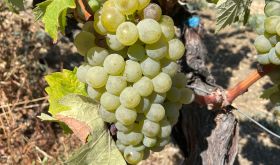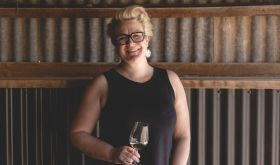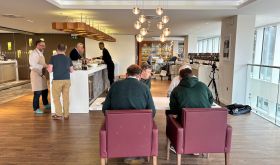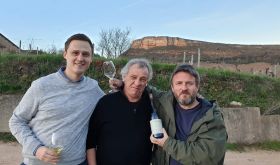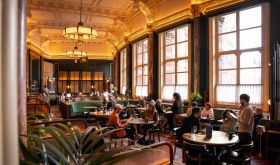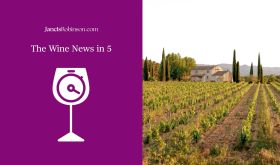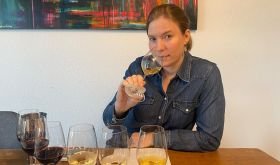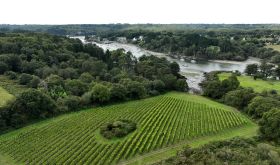19 January 1pm See Mark Savage MW's addendum below.
19 January 9am In preparation for The sad tale of OW Loeb, we're publishing this history of the venerable company. See also this front page news story published on ft.com today and in tomorrow’s print version.
Otto [Loeb] came over [to the UK] in 1934 and couldn’t trade as he was deemed an alien. However, his cousin Henry Gerson was already ‘dabbling’ in wine, so facilitated sales during the war. (Otto had come back from America a ‘failed' shoe salesman!)
Somehow Gerson had the good luck to find Sir Thomas Barlow (probably because he had bought Hock from him) and he was amazing at introducing Loeb to some fantastic customers including Glyndebourne, which was just starting off as an opera company but was already known for musical soirees, etc ... Christie, Ebert, Busch, etc also wanted German wines – so it was a very good showcase for OWL.
Anthony [Goldthorp, MD of OW Loeb] spent a year attached to the firm after he was demobbed but away in Germany meeting the growers. He may also have spent some time in France with Sichel.
David Dugdale was starting to get interested in wines and more importantly starting to buy by the late 1940s and early 1950s and found Loeb through an advertisement placed in André Simon’s International Wine & Food Society magazine.
He and Anthony thought they should start importing French wines and their first proper imports were late 1950s or early 1960s, particularly the 1959s. They had of course amazing wines from Germany in the late 1940s. They first bought champagne from de St Marceaux (a famous marque that no longer exists) and in Burgundy from Rousseau, Gouges, d’Angerville, Louis Michel in Chablis and of course claret. David was introduced to Edouard Cruse in 1948 through a fellow squash player who worked for a wine company called Hay & Sons in Sheffield. They later discovered Ch Rayas (probably in the early 1960s), Tollot-Beaut, Ramonet, Niellon and got the agency for Paul Jaboulet Aîné late on – about 1976 – through someone called Henry Farrar. Anthony and he had been in the war together; Anthony may have been his adjutant. It happened after Otto died. He was in a hospital in Trier with Parkinson’s disease and died in 1974.
They did of course bring other wines in, even bringing in Chilean wines in cask and bottling them; that was until too many casks came in empty or ullaged after the sailors had partaken of a drop or two, so they stopped that. It was called Don Pedro Riservato and was delicious!
Ted Day started to work for Loeb in 1951 – he had been Otto’s paper boy in Richmond for years. He knew nothing about wine but was mad keen on football and didn’t want to work on Saturday mornings so that he could play football so took the job. David supported him financially when he set up London Bridge Bonded Bottlers in 1967. In the beginning it was to bottle the German wines.
D’Angerville and Gouges were the two Burgundians who pushed hard for bottling at the domaine to get rid of the problem with bottle variation with so many different bottlers importing in bulk. At the same time the French château owners were keen to be more in control of their bottling, particularly Bordeaux.
David was first asked in the 1950s to put some money into OWL and lent them some. He became a director in 1961 and put money in then and helped to sort out other investors in the business. It limped along for a while needing more and more help. They were not businessmen it is fair to say ... Eventually he bought it in 1976 when the devaluation of the pound meant they were selling wines for less money than they had paid for them! It meant that Dugdale could offset their losses against his gains in Yorkshire after setting up a new ‘holding company’ Vinpol.
Val Goldthorp is still around – 90 this year – 30 years since Anthony died. Herr Steinlein, Loeb's German agent, died about 10 years ago. He really organised the German wines and ex-cellar sales to the likes of the Wine Society and the Scandinavian government monopolies. Everything else was organised through London.
Mark Savage MW of Savage Selections adds: I cannot resist offering you some thoughts on the OWL crisis from a former employee as I had the great privilege of working in their then Jermyn Street offices around 1972/73. Anthony Goldthorp had telephoned me one day to ask what I was up to and within a fortnight I was working there as the junior office clerk doing exciting things like typing out weekly bond clearance instructions to Ted Day at London Bridge Bonded Bottlers. This was not the work of a moment as it would be with today’s technology, given the number of German wines with such titles as Eitelsbacher Karthaeuserhofberg Riesling Auslese or, even worse, the Niederhaeuser Hermannshoehle Riesling Trockenbeerenauslese (all with two fingers on a primitive non-electric manual typewriter), so the names are etched deep in my memory as a result.
I feel sure that the Paul Jaboulet Aîné agency pre-dated the death of Otto Loeb in 1974 since I well remember meetings with Louis and Gérard Jaboulet and selling the 1966 Côte Rôtie, Les Jumelles, the remarkable [seconded – JR] 1967 Châteauneuf-du-Pape, Les Cèdres and of course the 1970/71/72 Hermitage, La Chapelle, bottles of all of which I am happy to have in my cellar today.
The cheapest wine on the list was that Chilean Cabernet you mention, actually called Viña San Pedro Reservado and very good it was too. I recall the well-known illustrator Edward Ardizzone being somewhat devoted to it.
I leapt at the chance of working for Loeb because I regarded them as the real purists of the British wine trade at the time and if I was going to make the wine trade my career I was keen to learn from them and follow in such footsteps. OW Loeb was thus a very important early influence for me and encouraged my own aspirations to try to be something of a purist myself in due course. I remember Otto Loeb well as a frequent visitor to the offices and I felt somewhat flattered when he expressed sadness at my decision to resign and leave London for the provinces.
There will of course be no shortage of vultures in the trade who will always be keen to pick at any juicy carcases on offer, but those of us who know Loeb well will have been sad at hearing of its recent problems and will be hoping that it manages to resurrect itself and return to its former glory.
Viscount Davidson comments: That is sad news about Loebs. When I eventually rose to being the Cambridge W&F Society Cellerar in 1957/8, I remember Dr Otto's previous tastings were the most educational of the many we had each term. 'My Schwaine [Steven Swain, sadly killed in a bus crash shortly after coming down], how many times must I tell you that there is no acceptable difference between a Traminer and a Gerwurztraminer?!!'
I was a great friend of both Tony and David D, whose house was built over and after his cellar! Someone should have mentioned Helen Thomson [agreed – JR], who must have ranked as the best PA in the wine trade and should have been made a director. Perhaps she was? One memorable evening she organised was a recital at Stationers' Hall with eight Schubert lieders accompanied by eight Maximin Grünhausers to taste alongside in the presence of their owner, Andreas von Schubert, finishing up with the Trockenbeerenauslese. He was a violent anti-Nazi, 20-stone cousin of Lady Howard de Walden and never forgave them for trying to make him get into a tank! There are plenty more memories, but let's hope it doesn't entirely collapse.


